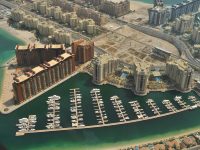What is LEED certification?
LEED (Leadership in Energy and Environmental Design) certification is an internationally recognised system for evaluating environmentally friendly and sustainable construction. This certification was developed by the United States Green Building Council (USGBC) and is used to evaluate the construction practices of property projects in terms of their environmental friendliness and energy efficiency.
Importance of LEED certification
LEED certification plays a crucial role in the property market, especially in cities such as Dubai, where sustainability and environmentally friendly construction are becoming increasingly important. By implementing LEED standards, developers and investors can ensure that their buildings are more environmentally friendly and use fewer resources, while improving the quality of life for residents.
Criteria for LEED certification
LEED certification is based on various criteria, which are divided into several categories:
- Location and transport: consideration of the building’s location and accessibility by public transport.
- Sustainable locations: Preservation of biodiversity and minimisation of environmental impact.
- Water efficiency: reducing water consumption through effective technologies and solutions.
- Energy and atmosphere: Increasing energy efficiency and using renewable energy.
- Materials and resources: Using sustainable materials and minimising waste.
- Indoor quality: Improving air quality and the well-being of users.
The LEED certification process
To obtain LEED certification, building owners must go through the certification process, which consists of several steps:
- Planning: projects are developed from the outset with LEED criteria in mind.
- Documentation: The required documents and evidence must be provided for the assessment.
- Evaluation: A panel of experts reviews the submitted documents.
- Certification: Successful projects are awarded the corresponding LEED level (Certified, Silver, Gold or Platinum) depending on the number of points scored.
Advantages of LEED certification
LEED certification has numerous advantages:
- Energy savings: buildings with LEED certification generally use less energy and water.
- Increase in value: Certified properties can achieve a higher market value and rental price.
- Marketing advantage: LEED certification can be used as a unique selling point to attract environmentally conscious buyers and tenants.
- Occupant health: By improving the quality of the indoor environment, the well-being of residents is promoted.
Current trends in Dubai
In Dubai, the demand for LEED-certified buildings has increased steadily in recent years. Developers and investors are increasingly focussing on sustainable building practices to meet the growing demands of the market. Projects such as Downtown Dubai show that modern design and sustainability can go hand in hand.
Illustrative example on the topic: LEED certification
An outstanding example of a LEED-certified building in Dubai is the Burj Khalifa. Not only is it the tallest building in the world, but it also fulfils numerous LEED standards. The developers have implemented innovative energy saving techniques, such as the use of recycled water for landscaping and the installation of energy efficient lifts. These measures have not only reduced operating costs but also helped to preserve the environment, making the project even more attractive on the global market.
Conclusion
LEED certification is not only a sign of environmentally friendly construction, but also offers significant economic benefits. It helps to make the construction industry in Dubai more sustainable while improving the quality of life for residents. Investors and developers who opt for LEED certification are sending a strong signal in favour of environmentally conscious and sustainable construction.








